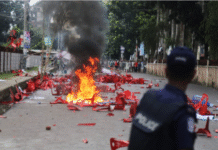Syed Bashir
For Bangladesh, the victory over Pakistan in 1999 was like a repeat of 1971 all over again. The 2015 victory against England, the one-time colonial rulers, is equally satisfying, not the least because it takes Bangladesh into the World Cup quarter-finals for the first time. For a country that was written off by Kissinger as a basket-case in 1971, Bangladesh has really turned the corner. All Bengalis are proud of that.
Nobel Economics Laureate Amartya Sen does not miss a chance to remind us that Bangladesh is ahead of India, and surely far ahead of Pakistan, in most areas of human development, both in terms of economic growth and social upliftment. When India suffers a current account deficit of billions, Bangladesh posts a current account surplus of more than $2 billion.The list is long and today is not the right time to recount the many achievements of Bangladesh as a nation.
For a country that has suffered one of the worst genocides in contemporary history at birth, this is vindication of doing the right thing in 1971. As Pakistan sinks into the abyss, riddled by the terror it has exported, Bangladesh fought the same terror and radicalism with a determination that has won the admiration of the world, including the West.
For someone who has seen 1971 at close quarters, the memories of the hundreds of thousands of young men going through the muddy roads piercing the green (remember Anshuman Roy’s “Sabujer Buk Chera Metho Pathe”) for an attack on the Pakistani troops remains as alive as ever. Many, at times most of them, did not return, but that did not stop more boys from taking that path again and again.
So it is difficult to control tears when a jubilant skipper Mashrafe Mortaza walks up to the presenter and dedicates the victory over England to “all the freedom fighters of Bangladesh.”
What a gesture! He could bowl his hearts out only because he has his heart in the right place.
The growing muscle of Bangladesh’s diaspora has been on display in this World Cup. Crowds have turned up at the remotest of venues like Nelson in New Zealand to cheer the team. And who are these people? At Nelson, if I got my information right, most of the Bangladesh supporters were construction workers employed in Christchurch after the 2011 earthquake.
These are the people who believe in Bangladesh, they toil hard for a living and a future but send their money back home (that explains record remittances) unlike the corrupt politicians and bureaucrats who siphon off millions to buy mansions in a wide arc from Malaysia to Canada. That is because they believe in Bangladesh and its future. Whatever their class origins, the best thing is they are not inhibited and shout their hearts out for the country and spend hard earned money to get into the stadiums.
This love for the country stands in stark contrast with the criminals who are all out to ruin the country’s economy and the hard work of millions, by burning trucks and buses and trains and even people alive. The latest victory and the wild celebrations across the country must drive home to these trouble-makers the point that they have to stop now. Or else …
Cricket has been a strong vehicle of nationalism in the sub-continent. A timely victory does wonders to national confidence.
In 1971, when India led by Ajit Wadekar beat both West Indies and England in consecutive series abroad, it gave the country a huge sense of self-belief. Here was a generation who would not retreat towards the square leg at the approach of a Freddie Trueman, but one who would hook and pull a John Snow or a David Brown if they dared bounce hard.
In another 12 years, India won the World Cup. In this generation, you have a Sourav Ganguly who will not hesitate to take off his jersey and swing it in jubilation at Lords because Andrew Flintoff had done something similar.
Bangladesh’s freedom is very hard earned – it materialised through an ocean of blood, as goes the song “Ek Sagar Rakter Binimoye.” It is important to remember that at all times so that such hard-earned freedom is not squandered away. The win against England is one such occasion and Mashrafe did the greatest thing by dedicating the victory to the heroes of 1971 and to “all those who work hard.” He has not forgotten the true heroes of Bangladesh – the men and women who work in fields and factories and in many other places – at home and abroad. They keep alive the true spirit of Bangladesh, of 1971, of hopes for a great future.
Source: Bd news24









